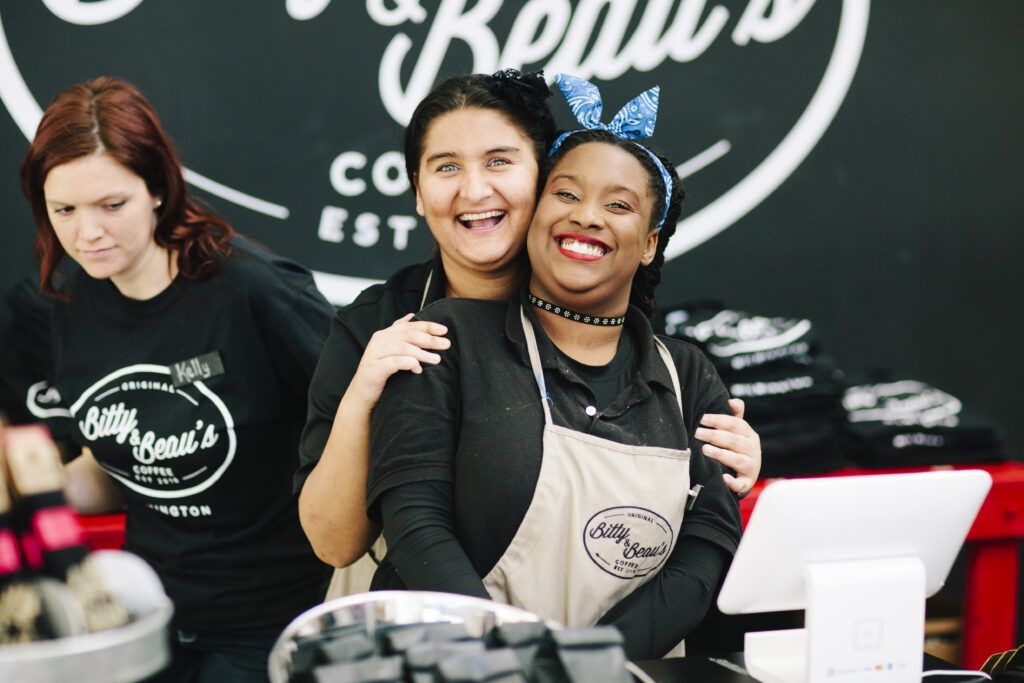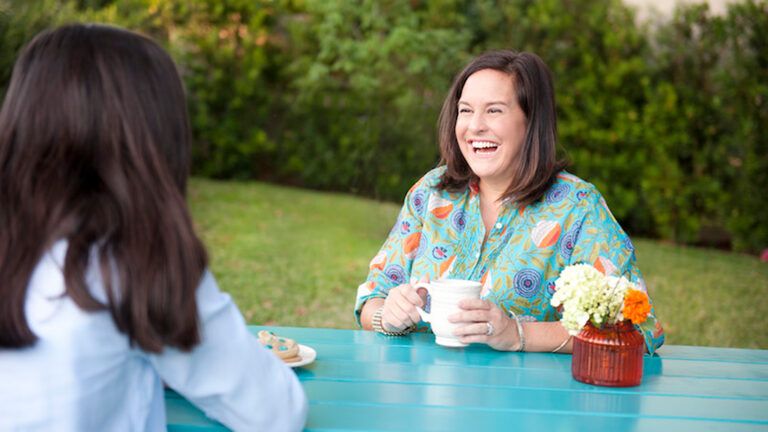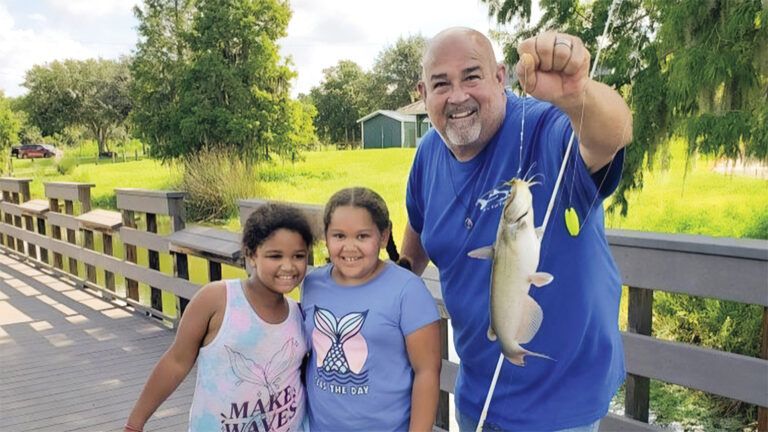At first glance, Bitty & Beau’s Coffee in Wilmington, North Carolina seems like your regular cafe. Friendly cashiers take your order at the counter, a knowledgeable barista prepares it; lattes, espressos, cappuccinos, they’re all on the menu. But co-owner Amy Wright and her husband Ben didn’t open the shop to just make a profit, they opened it to make a difference.
Named after the Wrights’ children — their son Beau and daughter Bitty—the popular spot has been featured on The Today Show, CNN and more because of the Wrights’ commitment to hiring people with intellectual and developmental disabilities (IDD).
“Everybody raves about how it feels like home when you walk in there,” Wright tells Guideposts.org.
For the Wrights, this shop is all about family. Thirteen-year-old Beau and seven-year-old Bitty have Down syndrome. When Wright read that only 35% of U.S. civilians with disabilities between the ages of 18 and 64 had a job, she started thinking of ways to help put a dent in that unemployment rate and to help her young children feel more included.
Neither of them had ever run a retail store and though they relied on caffeine to fuel their busy lives – she managed a performing arts studio, her husband was a financial consultant – they didn’t know a thing about selling it.
“We just started drinking from the fire hose,” Wright says, describing how the family consulted with friends that were coffee roasters and did plenty of internet research on how to run a business. “We just had a lot of faith that it would work out. I just believed that it was what we were supposed to do with our lives and it became our passion. When your passion and your purpose collide like that, there’s no stopping you.”
They put a call-out in their local community for job applicants. There were no qualifications needed just, as Wright says, “a positive attitude, a willingness to learn, and a dedication to what we’re trying to do.” They began with 20 employees who went through a two-week training program.
“We just kept role playing and practicing until we figured out, ‘Where is this person most comfortable? Where do they feel confident?’” Wright says. “Some of them are very comfortable crossing over into different roles, and some of them want the same thing every time they come in. They want to do the same task. So we just figured it out as we went.”
The store has now grown to 40 employees, all with IDD and a small management staff of typically-developing employees who are there to handle any emergency situations or deal with normal problems that may come up.
“Hiring people with IDD, it’s really no different than hiring people that are typically-developing,” Wright says. “Everybody has talent, everybody has skill sets. It’s identifying what those talents are and finding out the way that you can plug them into your business.”
The goal is to get people so comfortable and familiar with people with IDD that their disabilities aren’t the first thing you think of or notice when interacting with them, but you can’t help but recognize how Bitty & Beau’s differs from a regular coffee shop.
First, there’s usually a greeter at the door who welcomes you with a heartfelt hug. There’s always a knowledgeable cashier who helps customers choose their drinks behind the register, and your coffee doesn’t come with your name on it. Instead, after your order is placed, you’re given a playing card – the barista attaches a matching card to your drink order – and that card number is called when your coffee is ready.
“So many times the names are misspelled or you can’t read somebody’s handwriting and we just thought it was an original way to keep up with everything,” Wright says of the cards. It’s been a fun homework project for the employees too.
“A lot of our employees, when they started, didn’t know their numbers, so several of them would take a stack of cards home and practice with their parents, and come back and say, ‘I’ve mastered one through five,’” Wright explains.
She’s seen the shop work wonders in her seaside community.
“It’s not just what happens with the coffee shop and the experience people have when they come in there,” Wright says. “Our employees now leave their jobs with a new sense of confidence and purpose, and wherever they go in the city, they’re respected and they’re actually kind of revered. People think of them as celebrities and want to get pictures with them and get their autographs and things. I feel like we’ve created a different kind of culture here in Wilmington, and so that’s been one of the coolest parts about it.”
As a mother to two children with Down Syndrome, seeing other people with IDD succeed feels like an accomplished mission of sorts for Wright.
“I just feel like they’ve made us better people,” Wright says of raising her children. “They’ve made us care about things that we didn’t even know about before. It’s just like an appreciation for humanity. It’s far beyond people with intellectual and developmental disabilities. It’s caring about every life and the value that every person’s life has. When you watch your child go through being marginalized, being discriminated against, being overlooked, a fire is ignited in you. And you start wanting to change the world, not just for them, but for any other group of people that’s ever been marginalized that way.”
Through the shop, Bitty and Beau have made some lifelong friends – the family regularly goes on outings with their employees, taking them bowling or to support a staff member playing the harmonica at a local restaurant. But the real joy comes in knowing the shop isn’t just making their lives better, it’s doing the same for anyone who’s heard their story in Wilmington and across the country. And all it took was a cup of Joe.
“We can’t open enough coffee shops to affect the unemployment rate,” Wright says. “We’ll keep trying, but what we can do is change the way people see people with IDD. Once people value people with IDD, the way they do typically-developing people, then all the opportunity will just flow. We hope the big takeaway when people learn about us or experience the shop is that they go away thinking, ‘You know what? That person with Down syndrome, their life has just as much value as mine does and I need to find a way to include and accept them in my society.’”






